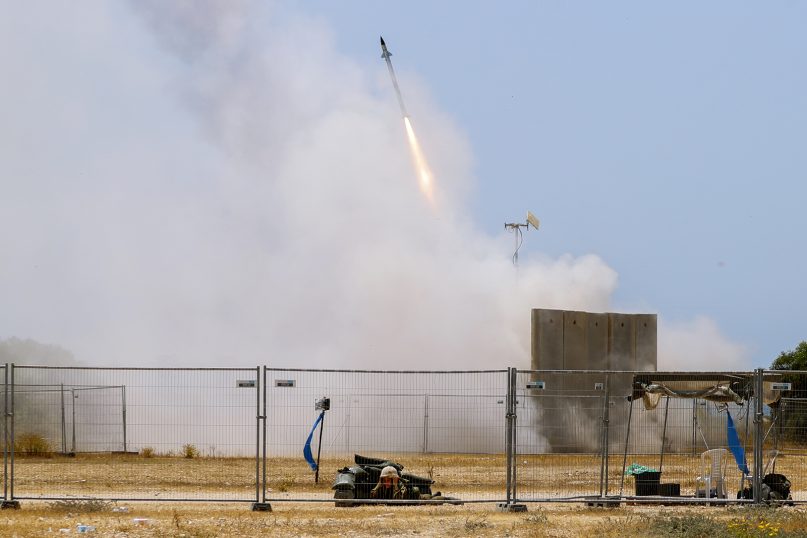(RNS) — It was supposed to be the first COVID-free holiday American Jews could celebrate in person — a joyous return to synagogue and a celebration of at least some semblance of normalcy.
Instead, Shavuot, the Jewish holiday that celebrates the giving of the Torah at Mount Sinai, which begins Sunday night (May 16), may be especially fraught this year.
While many Jews will meet in person either outdoors or inside the synagogue — studying sacred texts with a side of cheesecake, as is the tradition, which calls for eating dairy — the specter of an escalating conflict, if not full-out war, between Israel and Gaza may blunt some of the cheer.
On Friday, Israel stepped up its attack on Gaza with a ground incursion in addition to airstrikes. More than a hundred have been killed and hundreds more injured, most on the Palestinian side. Many American Jews, watching from the sidelines, are shocked and bewildered by the pace of events, which began last week with the Israeli police raid on the Al-Aqsa Mosque in Jerusalem.
They are also divided.
RELATED: Religion plays a role in the renewed conflict in Israel, but it may not be what you think
U.S. Jews have a wide range of views about Israel and the Israeli government’s policies. A Pew poll released earlier this week showed fewer than half of U.S. Jews give Israeli Prime Minister Benjamin Netanyahu “excellent” or “good” ratings for his leadership. And just 1-in-3 say they think the Israeli government is making a sincere effort toward achieving peace with the Palestinians.
But while concern for Israel is central to synagogue-going U.S. Jews, there is a vast gulf between Democratic and Republican-voting Jews on whether Israel is making a sincere effort toward peace with the Palestinians. Two-thirds of Jewish Republicans say they think the Israeli government is sincere in its efforts with the Palestinians, compared with 1-in-5 Jewish Democrats.
Many Jews will go to great lengths to avoid engaging the subject, which makes gatherings difficult.
“Coming out of the coronavirus pandemic, it’s incredibly important for us to take really seriously what it means to try to regain the ability to be together,” said Rabbi Ariel Stone of Shir Tikvah, an independent synagogue in Portland, Oregon.
Some are going to try.
On the evening of Shavuot when many Jews gather for an all-night Torah study marathon, Rabbi Josh Weinberg said he was switching plans and will instead provide a space for people to exchange thoughts about Israel.
“It’s definitely the elephant in the room,” said Weinberg, vice president of Israel and Zionism for the Union of Reform Judaism, which encompasses 850 synagogues in the U.S. and Canada. “Everybody’s thinking about it and talking about it. If people have questions, I’m happy to provide some analysis.”
He acknowledged that Jewish polarization on the subject of Israel has grown but that so, too, has the desire to better understand what is happening and how U.S. Jews can, or should, respond.
Rabbi David Lerner of Temple Emunah in Lexington, Massachusetts, said he, too, will provide space for talking about Israel at Shavuot observances.
“It’s really tricky,” Lerner said.”We have people who believe we should be on the streets protesting in support of Israel because Israel is under attack. And we have people who feel like we should be be criticizing Israel for its nation-state law, for its heavy-handed police forces and its right-wing government that hasn’t done anything for peace.”
On Thursday, 88 rabbinical students published a letter in The Forward calling on the Jewish community to bring their aspirational views of Israel more in line with reality.
“As American Jews, our institutions tell stories of Israel rooted in hope for what could be, but oblivious to what is,” the letter said. “ … weak condemnations of violence are not enough; we need something bigger, deeper, rawer, more transformative than that.”
Rabbi Jill Jacobs, executive director of T’ruah: The Rabbinic Call for Human Rights, said more rabbinical students are going on trips to the West Bank and East Jerusalem and have met with Israeli human rights leaders. Her own organization has taken 200 rabbinical students on such trips.
“Some are now in the pulpit and can have conversations with their communities about what’s happening to Israelis and Palestinians,” Jacobs said.
The lessons of Shavuot, which marks the moment Moses gave the ancient Israelites the Torah, including the Ten Commandments, may, after all, be an opportune moment to talk about Israel. That’s because the giving of the law came right before the ancient Israelites came into the land that is now modern-day Israel.
“You might not think that the step after being liberated from slavery is to give a set of laws,” she said. “But it’s actually crucial to have a set of laws to govern one’s behavior, especially as you’re preparing to take sovereignty over a land of your own. That lesson from Shavuot is a way of talking about what it means to have sovereignty in Israel as a modern nation state and what the responsibility of sovereignty is.”
RELATED: The growing Jewish divide





